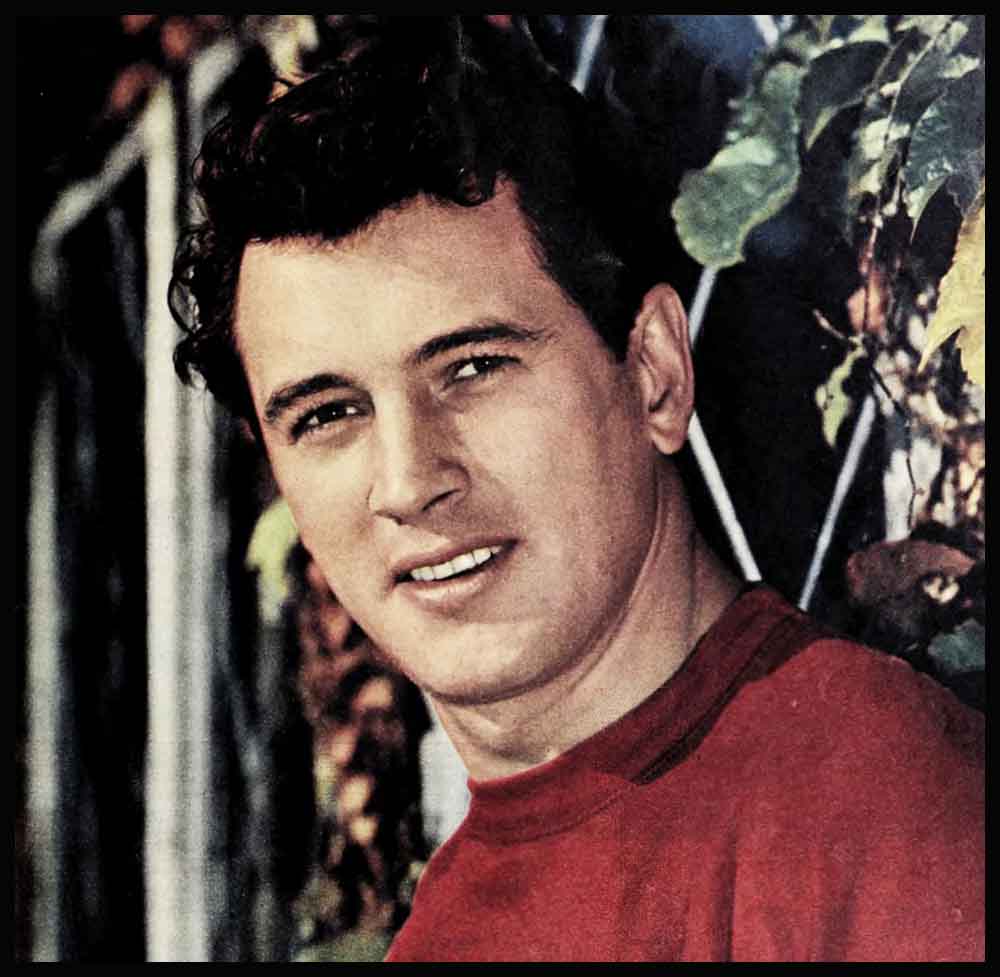
Rock Hudson’s Hideaway
It was an odd thing to do. But he couldn’t help it. He’d been standing in front of the house, just looking at it— looking at the beams and bricks and shingles that were a part of this snug structure. He walked over and placed his hand against the barn-red board siding, touching it affectionately as you would a pet—in a way it was—to Rock Hudson.
“As far back as I can remember,” Rock says seriously, “I have lived in other people’s houses. When I was a kid, during the bad times when money was scarce, we lived with our relatives. Then later, there was a succession of landlords with rented houses and rented apartments and never a place I could call my own.
“But now, at last, I have my own house with a hearth and a latchstring and a winding garden path. And it gives me a nice comfortable feeling, a real feeling of belonging. I like it.
AUDIO BOOK
“To me, having my own house means being able to turn on the record player full blast or let the water run for a bath at three in the morning.”
He paused, pulling at one ear lobe reflectively, “Now don’t read anything deep and psychological in my wanting to do this. It’s nothing like that. Just a simple matter of letting off steam. You know how a colt kicks up its heels when it’s let out of the barn. Well, that’s me. Just kicking up my heels in this wonderful new freedom of my own home.”
Rock’s house stands on a hillside, at the end of a little canyon, high above the Sunset Strip. Behind it, the steep bill is a lush tangle of vines and ivy. At the sides and across the front, tall evergreen trees provide quiet and privacy, two things Rock had been looking for.
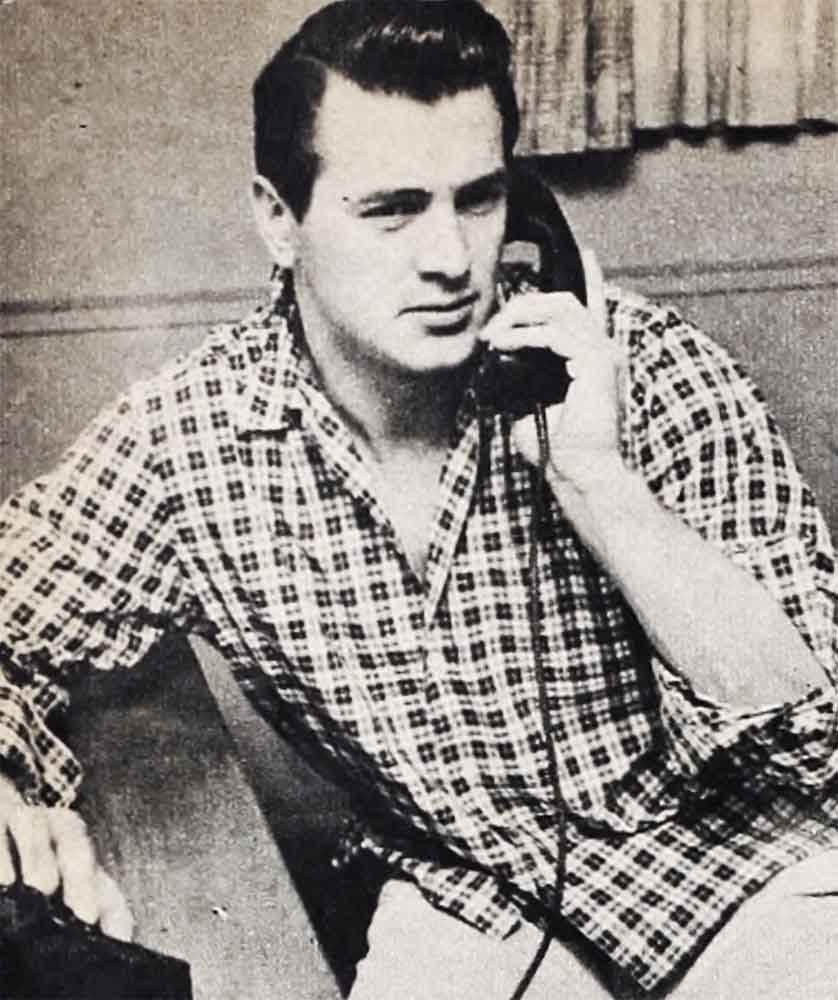
“I wanted to be within fairly short driving distance of the studio,” he says, “and at the same time I was looking for a sort af peaceful rural atmosphere. This combination wasn’t too easy to find.”
Rock had started looking for it nearly four years ago. He searched through the ads in newspapers. On Sundays, or when he had a day off from the studio, he hopped in his car and drove for miles on a constant house hunt. He talked to a number of real-estate dealers.
“Just what do you have in mind?” the realtors asked him.
Rock scratched the back of his neck. “Well, something not too big and not too small.”
“But what style? Modern? Colonial? Early American?”
Rock spread his hands. “It doesn’t matter about that. I want a friendly, comfortable house—a house to live in and be happy.”
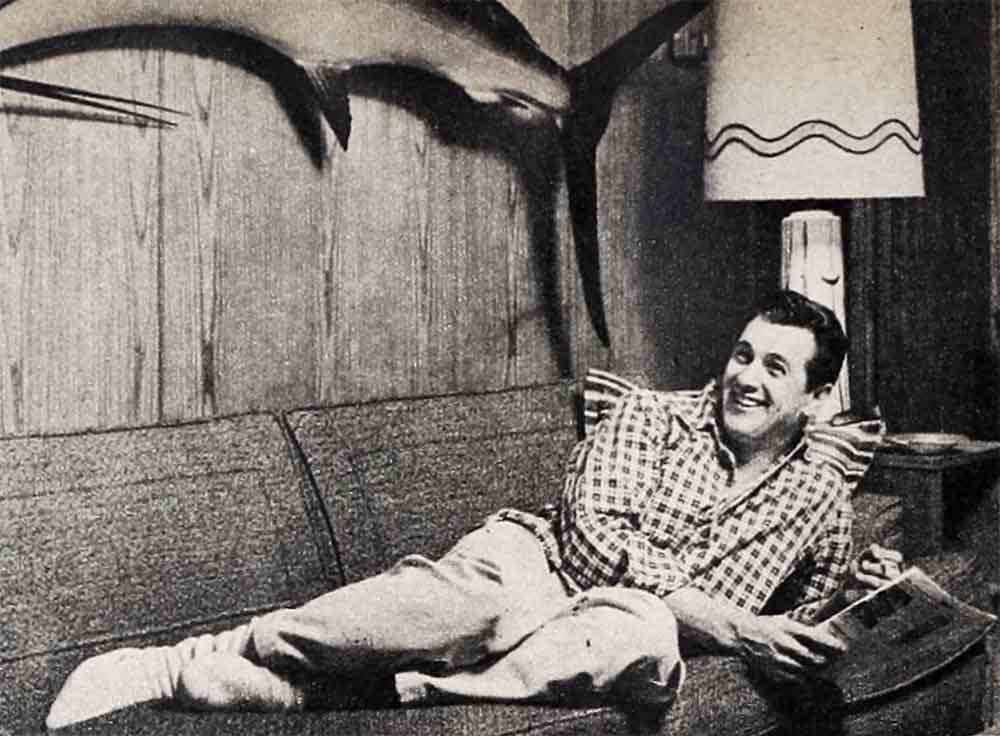
The realtors looked a trifle exasperated. “You don’t give us much to go on.” they complained.
“I guess not,” Rock agreed cheerfully “But one thing I’m sure of.”
“What’s that?”
“I’ll know it when I see it.”
The search went on, month after month, at every available opportunity. And then one day, just when he was at the point of being discouraged, Rock drove up the side of the hill and looked in through the spiky-needled trees and there it was.
The driveway was steeply curved. The house clung serenely to the hillside, looking weathered and mellowed as though it had always been there. The realtor said. “It was designed and built that way. Actually it is only four years old.”
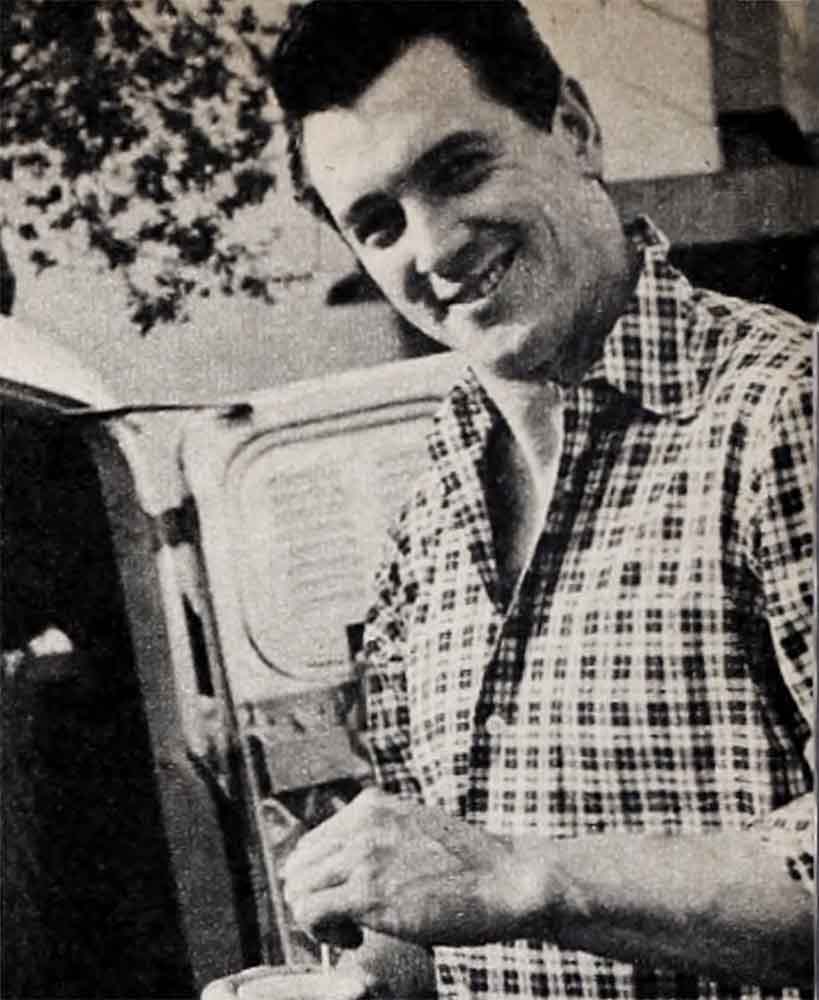
The roof was built of split redwood shakes, and the house was long and low. It was flanked with a barn-type double garage at one end and a secluded tree-sheltered patio at the other. Paths made of bricks and cushioned with pine needles led all around from front to back.
When Rock opened the front door and walked into the living room, he experienced a curious feeling of coming home He felt like a kid who has run away and been cold and tired and hungry and then has come home again?
The room was just the right size, small enough to be cozy but spacious enough to entertain his circle of friends. It had a hand-rubbed beamed ceiling and a fireplace and a windowed dining alcove. The floor was made of pegged and polished wood cut into random widths and lengths. Rock knelt down and ran his fingers over the boards.
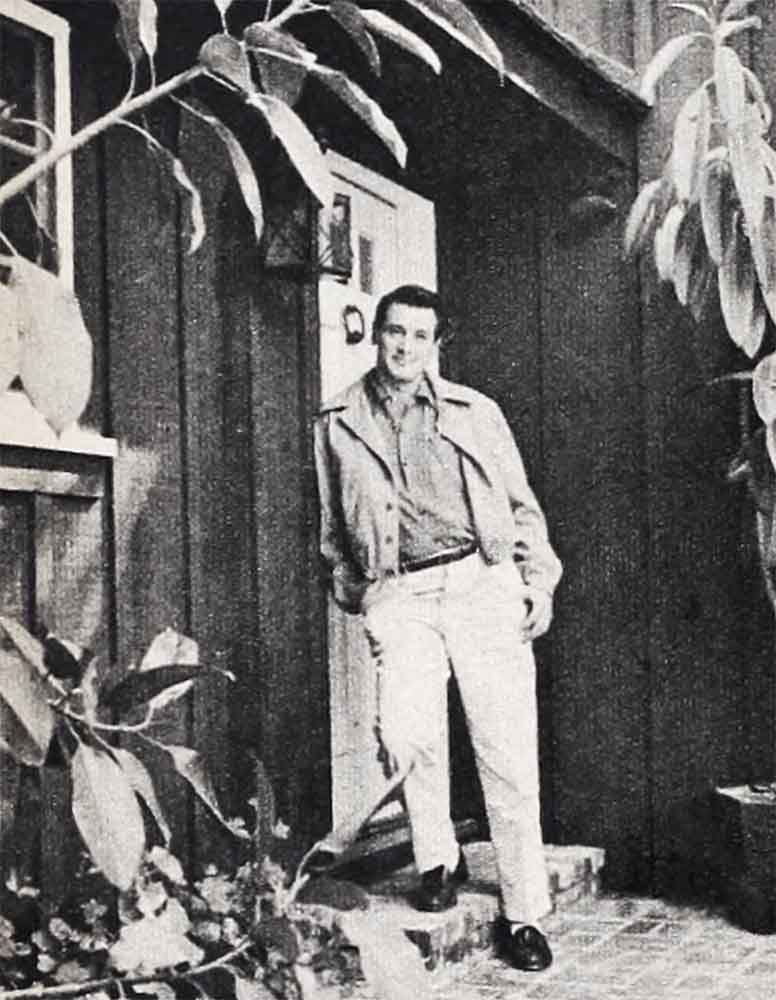
“This wood looks hard enough and solid enough to be teak,” he said.
The owner beamed proudly. “Why that’s exactly what it is,” he declared. “And it’s plenty hard all right. I know because I tried one evening to saw a piece of it.”
In the kitchen there were rubbed fruit-wood cabinets and a complete barbecue with an electric revolving spit. There was a breakfast nook and a walk-in bar with clever push-out shutters that opened into the living room. The bathroom had a glassed-in shower and a marble-top wash basin. There were two bedrooms, and one of them had a Dutch door leading onto the patio which was paved with redwood rounds.
When Rock saw all this, he knew he wanted it. But having known poverty, he was aware of the value of a dollar. Aware, too, that sometimes prices are jacked up plenty for movie stars. So he said to the real-estate agent, “Let’s see if we can make a dicker.”
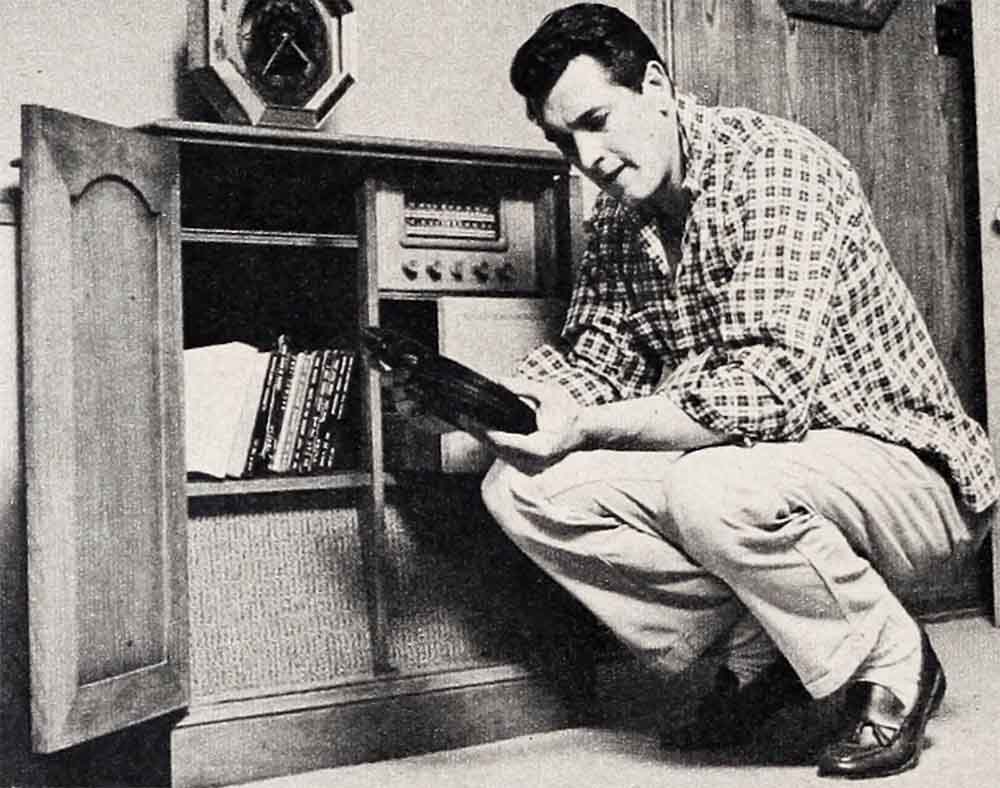
Rock made a low offer and the owner came down some. Then Rock went up a little and the owner came down a little. After a couple of weeks they agreed on a figure that seemed fair and equitable to both; they signed the papers and they shook hands on the deal. Only then did it occur to Rock. He had a house but didn’t own a stick of furniture—not a chair or a table or even a bed to sleep in. Nothing but a record player and some books and clothes and a few stacks of records.
The former owner sympathized with him. Taking Rock out to the garage, he pointed to a set of redwood patio furniture. “Maybe this will do for a while.”
Rock dug out his checkbook again and bought the garden furniture on the spot. There was a dining table with benches, a double chaise lounge and a couple of other pieces. These solved part of his problem. Then he went out to buy a bed. He told the clerk he wanted a great big one.
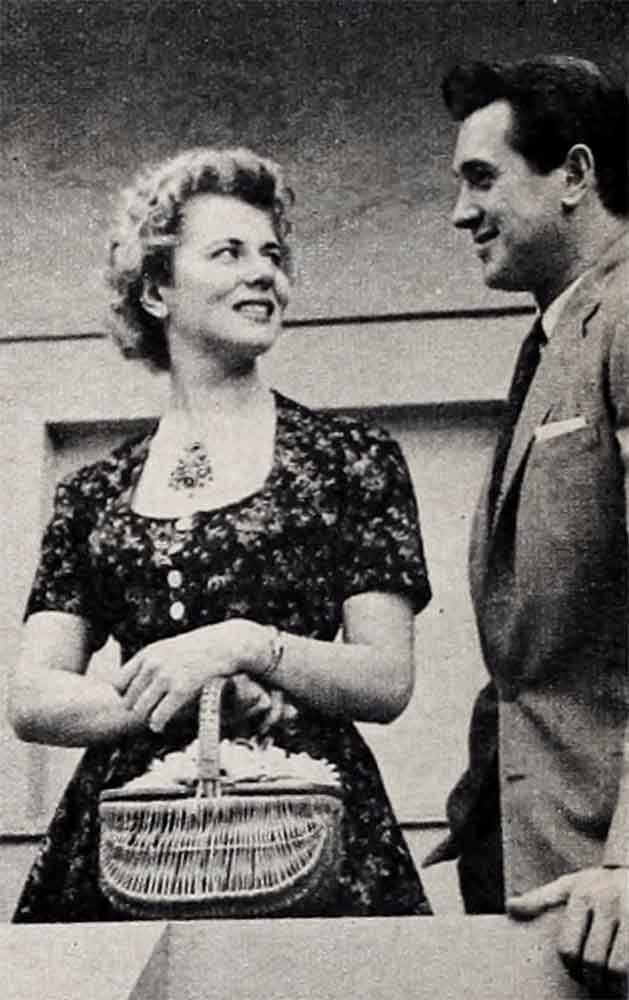
The clerk eyed Rock’s two-hundred-pound bulk and his towering six feet four inches. The clerk said, “Man, you need a great big one.”
Rock stretched out on several display beds, just trying them on for size. Each time he shook his head. Too snug. The clerk brooded a while and shrugged his shoulders. Then he said brightly, “Guess the only thing to do is build one special.” So Rock settled for a hand-built job that measures eight feet long and six feet wide.
When the bed was delivered, the men had trouble getting it through the doors. But after it was finally set up and Rock had a chance to try it, he was pleased with it. “It sleeps real good,” he says. “Gives me plenty of room to flail around if I want to.”
He thought he was temporarily set, but Truitt told him different, Truitt “does” for Rock, and has for a couple of years. She comes two or three times a week to clean and scrub, cook if necessary, and wash his shirts. Truitt took one look at the new house and raptured quite a spell. “Mister Rock, it’s beautiful!” Truitt said. “We goin to be awful happy here for sure.”
But when she walked out to the kitchen Truitt had a shock. There were big empty spaces where the stove and refrigerator ought to be. “Mister Rock!” she fussed at him. “What have you been havin’ for breakfast?”
‘‘Why coffee, of course,” Rock told her. “I make it right here in this electric percolator.”
“Pshaw!” Truitt said. “You ought to have eggs and bacon and hot bread, some-thin’ solid to put in your stomach. Now you go out and get yourself a stove and a refrigerator right away. You hear me?”
It was a sound suggestion. Every home ought to have a stove and a refrigerator, Rock decided. But he was busy from morning till night in “All That Heaven Allows,” in which he was co-starring again with Jane Wyman. Besides, he had never bought a stove or refrigerator before. Where do you start?
“No problem at all,” Jane told him on the set. “Just put your inexperienced hand in mine the next time we have a couple of hours off and I’ll show you how it’s done.”
Two days later Jane and Rock piled into his convertible and drove to an appliance store on San Fernando Boulevard. Rock parked about halfway down the block. Walking back, they passed a record shop and Rock grabbed Jane’s arm and steered her inside.
“Hey!” Jane yelped. “We want to buy a stove. Not rec—”
“Won’t take a minute,” Rock said. “I want to show you this dance called the Baiaio. It’s the big thing in Europe this year. Especially in Italy.”
Rock asked the clerk for the record Baiaio. The clerk dug one out and put it on the turntable. Rock showed Jane the step and then held out his arms.
“For heaven’s sakes,” Jane said. “Not right here.”
“Relax,” Rock said, and put his arm around her. “Now listen to that rhythm. It’s sort of a slow mambo.”
Jane grinned an Oh, well. The music had a strong beat, and they danced the Baiaio up the small aisle.
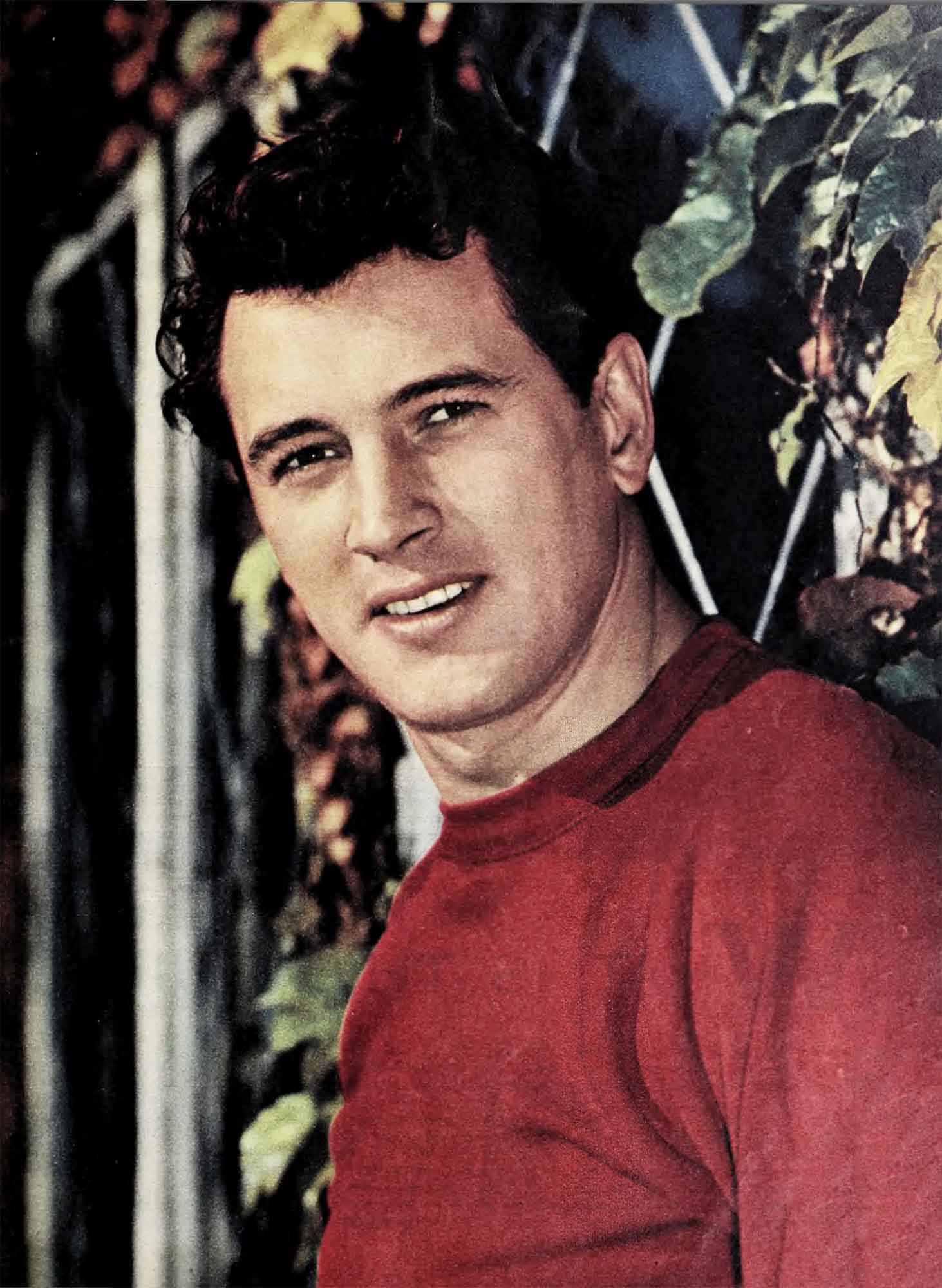
When the record ended, Rock paid for it and presented it to Jane. Then he led her out into the sunshine again.
“Well, now,” Jane said, “I guess we better buy that stove—”
“Wait a minute!” Rock interrupted, pointing. “Look at this wonderful antique store!”
“Oh, no!”
“Some friends of mine,” Rock said, “have their whole house furnished with Early American antiques. It’s very effective.” He took Jane firmly by the arm, lifting her a couple of inches off the sidewalk. “Let’s go in, just to look around.”
Jane said, “But—” and futilely tried to drag her feet, but Rock didn’t seem to notice. They browsed among the cobblers’ benches, pine rockers and other ante-bellum items. After a while Jane nudged Rock with her elbow.
“Have you forgotten that we are supposed to be shooting a picture over at Universal-International today? This afternoon.”
“True, true,” Rock said, sighing deeply. “Well, lackaday. Back we go to the old treadmill.”
Outside. Rock turned toward the car, but Jane dragged on his arm and skidded to a I stop.
“Now hold on,” she protested. “We started out to buy a stove and a refrigerator. Remember?” Jane led him into the appliance store. She gave the clerk exact instructions about a stove with a top griddle, adjustable broiler, warming oven and a deep well cooker. The clerk showed them a dandy finished in metallic copper. Rock said, “That’s fine. We’ll take it.
Jane instructed the clerk about the refrigerator. She specified freezing unit, automatic defroster, meat compartment, vegetable crisper and feather-touch ice cube trays. And the whole thing had to fit into a space 31 inches by 65 inches.
The clerk demonstrated a shiny copper fourteen foot giant.
Rock said, “That’s fine. We’ll take it.”
While the clerk wrote out the order, Rock’s eye was caught by a white gadget with a glass front. The clerk said it was not a new-type television set but an automatic washer with unique pulsator action that releases all the cleansing power in your soap or detergent.
“Well, how about that!” Rock said admiringly. “Now what’ll they think of next!”
Jane kicked him on the ankle.
Rock said, “Fine. We’ll take one of these, too. Truitt’ll be crazy about the unique pulsator action.”
Back at the studio Rock said, “Gee, Janie, thanks a lot for going with me. I never knew shopping could be so much fun. You were a big help.”
Janie gave him an oblique look. “Think nothing of it,” she said. “I wouldn’t have missed it for the world.”
When the new stove was delivered, Rock couldn’t wait before he cooked something on it. He thought something exotic and complicated would be just the thing. Something like Beef a la Stroganoff or maybe a good rich stew so he could use the deep well cooker. But he finally settled on a seven-rib beef roast. Then he telephoned Phyllis Gates.
Phyllis and Rock share a lot of dates these days. Some of the town gossips have this pegged as a hot romance item. One close friend says, They’re a cute couple and they certainly enjoy each other’s company. You just can’t tell what will happen.” Phyllis and Rock are completely mum on the subject. They don’t act like they’re ready to make any announcements . . . yet. But they are fairly steady company, and they do have a lot of fun together.
“I’m giving a party,” Rock said, “and I you’re invited. Also George Nader and Martha Hyer.’
“Wonderful,” Phyllis said. “I’ll do the shopping.”
When George and Martha walked in the front door, Martha threw a penny into a corner. “It’s an old Swedish custom,” Martha said. “It’s supposed to bring good luck and wealth and happiness.”
The roast was a large success, crispy brown on the outside and pink in the center. And Rock served a bottle of Beaujolais, which is his favorite of all the wines he sampled while in Europe last year.
“A toast. A toast,” George said. And they raised their glasses and drank to all the good things friends drink to. Later they sprawled on their stomachs and looked at the plans for the new pool.
“I really wanted a pool,” Rock said, “be cause swimming is about my favorite form of tun and exercise. At first I wasn’t sure that I could afford to have one put in. Then after I got several bids I decided the budget would be able to take it.”
He spread the plans out in the center of the floor. “This is where they’ll excavate,” he said, “right here at the top of the drive way. It was too steep anyway. Sort of a hazard when it rained. We’ll make the garage over into a playroom, with an adjoining shower and dressing rooms. And the pool will be right there in front of it, Then we’ll build a new garage down at the bottom of the hill close to the Street.”
Some of Rock’s friends suggested that he have an interior decorator furnish and decorate his house, but Rock turned thumbs down on that.
“I don’t want that at all,” he says. “Some decorators do a wonderful job, but they’re a little too perfect for me. When they’ve finished with a house it’s fine to look at, but not always so much fun to live in.
“No, I want to do it my own way, even if I make some mistakes. I’ll do it gradually, just buy a piece at a time. Maybe all of it won’t match perfectly, but it’ll be my own. And I know it’ll be comfortable and livable.”
Rock brought back some beautiful things from Europe. He bought a fine pair of antique porcelain whiskey barrels in London. He will have these wired and made into lamps. In Florence he picked up some antique leather cigarette boxes and several of the ancient maps of Italy he purchased there he will frame. He also ran across some excellent water colors and pen sketches in Venice. In an old hideaway shop he found two equestrian pieces of bronze on marble. And if these are an indication of the way he will decorate his house, you can rest assure that it will be done in excellent taste.
Inevitably, an inquiring reporter asked him the sixty-four-dollar question. “Now that you have a house, how about a wife to share it with you? Are you planning to get married and settle down?”
“No,” he said, “I don’t think I’m quite ready for marriage just yet. I’m still pretty footloose, I like to do what I want to do when I want to do it. As long as I feel that way, I don’t think it would be fair or sensible to consider marriage.
“My European trips have been a revelation to me. I know I have learned a lot over there. And I grew up some, too. I traveled all the way from Ireland and England down through France and Italy. I visited all the famous historic spots. I even went swimming in the Blue Grotto in Capri. But most of all I enjoyed meeting and talking to the people of Europe.
“Their way of life is so different over there. There’s less talk about business and making money. The Europeans are more relaxed. They are happy and content with much less. They enjoy the little things in life. They have a sort of candlelight-and-wine attitude that is very pleasant. I was terribly impressed with this. I’d like to go back there for a while at least.
“This summer I’m making ’Giant,’ with George Stevens directing, and I’m very excited about it. But after that, I’d like to take a long cruise on a slow freighter Maybe to South America, and maybe back to Europe again. At any rate, I want to keep moving around, seeing new places and learning new things.
“Of course, like everyone else, I’m looking for happiness. And I know one way to achieve this is to love and be loved That’s why I’m looking forward to the day I will get married and begin raising a family.
But right now . . . well, my feet are pretty itchy. There’s a great big world out there, and I’m mighty curious about it. That’s one reason I’m so happy about this new house. It’s like putting down some roots. No matter where I travel, this will be a great house to come home to.”
THE END
It is a quote. PHOTOPLAY MAGAZINE JULY 1955
AUDIO BOOK




